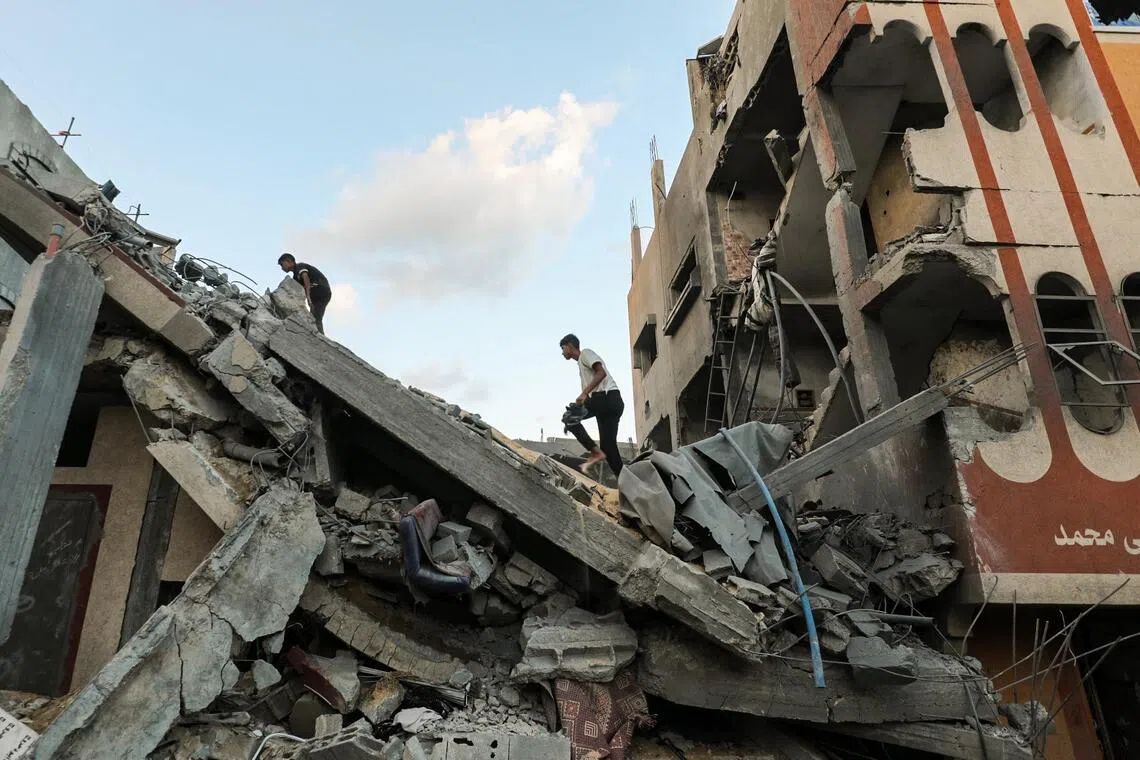‘Enough is enough’: Many Palestinians say Hamas must accept ceasefire plan
Sign up now: Get ST's newsletters delivered to your inbox

Palestinians checking the rubble of a building hit by an Israeli strike in the Nuseirat refugee camp in the central Gaza Strip on Sept 25.
PHOTO: AFP
TEL AVIV, Israel – Palestinians in the Gaza Strip have spent almost two years longing for an end to the war that has destroyed their communities and killed tens of thousands of their neighbours. Many say their best hope yet is the latest ceasefire plan proposed by the US
“Hamas must say yes to this offer – we have been through hell already,” said Mr Mahmoud Bolbol, 43, a construction worker who has remained in Gaza City with his six children in the battered shell of their home throughout the war.
US President Donald Trump unveiled the proposal while meeting Israeli Prime Minister Benjamin Netanyahu at the White House on Sept 29.
Mr Trump said if Hamas did not accept its terms, he would give Israel the green light to “finish the job” of destroying the armed group.
Hamas has not yet given its response to the proposal, but interviews with Palestinians in Gaza on Oct 1 suggested widespread public support for the plan. It calls for an immediate end to a war that has brought immense civilian suffering.
Mr Bolbol said that for the past two days, his neighbours have talked about almost nothing but the ceasefire proposal. He added that if Hamas rejects it, his family would finally leave Gaza City and head for what he hoped would be the relative safety of the enclave’s south.
“Hamas needs to understand: Enough is enough,” Mr Bolbol said. Most Palestinians in Gaza are not members of the group, he added. “So why drag us into this?”
The plan requires Hamas to release all the remaining hostages it seized during the Oct 7, 2023, attack on southern Israel within 72 hours of the proposal going into effect. That includes an estimated 20 abductees believed to still be alive and the bodies of about 25 others.
In exchange, Israel would release about 250 Palestinian prisoners serving life sentences in Israel, an additional 1,700 Palestinians detained during the war and the remains of 15 dead Palestinian prisoners for each Israeli hostage whose body is returned.
But the proposal contains several elements that Hamas has said are unacceptable.
Those include a ban on the group exercising future power in Gaza, a requirement that it disarm and the establishment of a transitional government overseen by foreign officials, including Mr Trump and former British prime minister Tony Blair.
The proposal unveiled on Sept 29 sent a rare flash of hope through Gaza, people said in interviews. But others are less hopeful.
Some people said the terms of the proposal made them doubt that Hamas would agree. Others said their doubts grew from something more basic and bitter: They simply did not believe that Hamas would put the interests of the Palestinian people above the interests of the organisation.
“We are dying for nothing, and no one cares about us,” said Ms Nasayem Muqat, 30, who fled Israel’s expanding military campaign in Gaza City for the territory’s south on Sept 29 with her young daughter Selene.
“Hamas needs to think more (about) us and what we have been through.”
Mr Abdelhalim Awad, 57, who manages a bakery in Deir al-Balah, in central Gaza, said he would accept almost “any price” to end the war. But he said he did not believe that Hamas could say the same thing.
“They don’t care about what people think or public opinion,” he said. “If they cared about that, we wouldn’t be in this situation.”
In Khan Younis, in southern Gaza, Mr Mahmoud Abu Mattar, said he hoped the US could somehow force Hamas to accept the deal and then make both the armed group and Israel abide by all its terms.
“My wish is that Trump forces it as a reality on both sides, directly, without giving a choice,” said the 35-year-old who was once an accountant in Gaza City.
He said that fighting had forced him to move around northern Gaza 10 times with his wife and three children until last week, when they fled to the south for the first time.
Mr Abu Mattar added that he was disgusted with the negotiators in faraway conference rooms who seem to control his family’s fate.
“The ones negotiating on my behalf are sitting in air-conditioned rooms,” he said. “They are not the ones living in sand, walking half an hour to fetch water or searching for a bag of flour and getting killed.” NYTIMES


